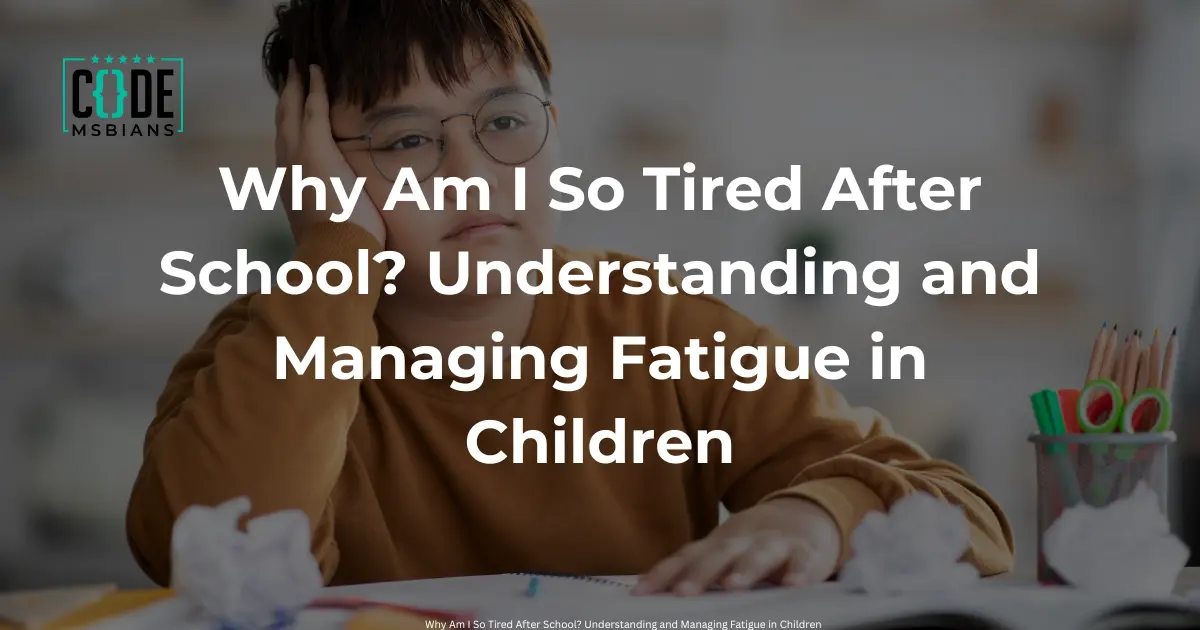Why Am I So Tired After School? this question says a lot….
It’s common for children to feel tired after a full day at school, but sometimes this tiredness can be overwhelming.
If your child often asks, “Why am I so tired after school?” you’re not alone. Understanding the causes of tiredness and how to manage it can help your child feel more energised and ready to learn.
In this blog, we’ll explore the causes of after-school fatigue and share practical tips to help your child stay refreshed and focused.
Why do children feel tired after school?
Children’s bodies and brains work hard all day – learning, socialising and moving around. Fatigue after school can be caused by a number of factors:
Physical exertion: Running, playing and walking can tire muscles.
Mental fatigue: Focusing on lessons, processing new information and problem-solving uses a lot of brain energy.
Emotional stress: Social interactions, peer pressure or worries can drain energy.
Poor sleep quality: Not getting enough or restful sleep at night leads to daytime fatigue.
Missing meals or relying on processed snacks may leave children feeling drained and unfocused.
Signs that your child is experiencing excessive fatigue
- Difficulty concentrating or staying alert
- Irritability or mood swings
- Complaints of headaches or stomachaches
- Falling asleep quickly or feeling sleepy during the day
- Lack of motivation for homework or activities
If these signs persist, it’s important to explore possible causes and solutions.
How to manage your child’s fatigue after school
1. Ensure consistent, quality sleep
Keep a consistent sleep routine every day of the week, including weekends.
Create a calming bedtime routine (reading, warm baths, no screen time)
Keep the bedroom dark, cool and quiet
2. Provide balanced meals and snacks
Balanced meals should include a mix of healthy fats, lean proteins, and whole grains.
Avoid sugary snacks that cause energy spikes
Hydrate well with water throughout the day
3. Encourage physical activity – but keep it balanced
Moderate exercise boosts energy and mood
Avoid overscheduling sports or activities immediately after school
Allow time to rest and relax after physical exertion
4. Support emotional health
Talk openly about your child’s school day and feelings
Help them develop skills to cope with stress and anxiety
Consider meditation or relaxation exercises
5. Create a relaxing after-school routine
Take breaks between homework and breaks Make quiet time for your child
Include short breaks or nap time if needed
Encourage your child to pursue hobbies that they enjoy and find relaxing
When to consult a healthcare professional
If your child’s fatigue is severe, lasts for more than a few weeks, or is accompanied by other symptoms (such as weight loss, persistent pain, or mood swings), consult a pediatrician to rule out medical conditions such as anemia, allergies, or a sleep disorder.
Final thoughts
It’s normal to feel tired after school, but excessive fatigue can interfere with your child’s learning and happiness. By understanding why am I so tired after school and taking small steps to improve sleep, nutrition, activity, and emotional health, you can help your child regain energy and enthusiasm.
Remember, every child is different — listen to their needs and create a supportive environment for rest and recovery.




